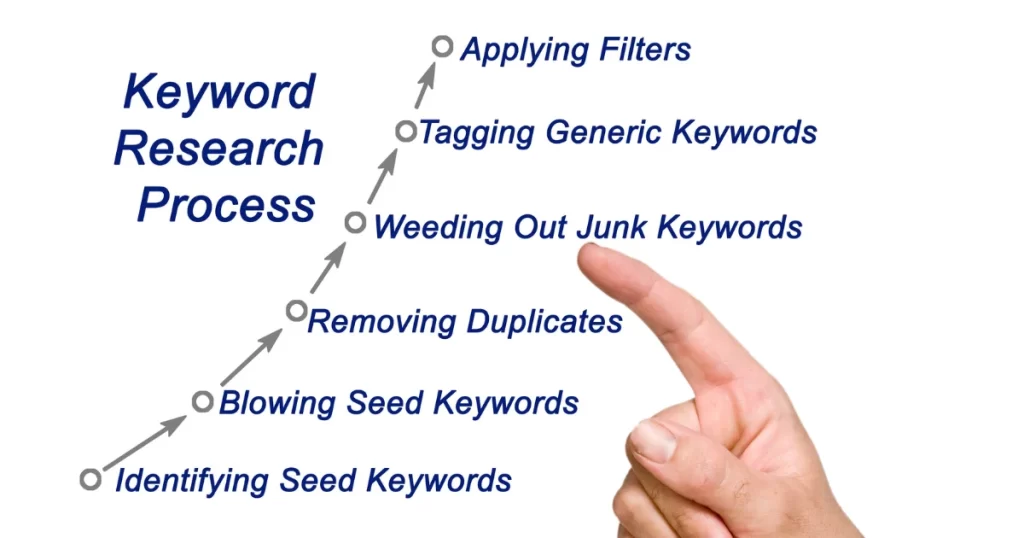Keyword research: two words that can make or break your blogging empire. Whether you’re a newbie blogger dreaming of going viral or a seasoned content wizard, mastering keyword research is like finding the magic map to the treasure chest of organic traffic. But let’s face it—choosing the right tools for the job can feel like picking the best avocado at the store: overwhelming, highly specific, and bound to go wrong if you don’t know what you’re doing.
Fear not, fellow bloggers! Here’s your no-nonsense guide to the 10 Best SEO Tools for Keyword Research for Bloggers in 2025. Let’s dive in, one keyword-packed step at a time.
The Importance of Keyword Research for Bloggers in 2025

Picture this: you’ve just poured your heart, soul, and maybe even your Starbucks budget into crafting the perfect blog post. It’s witty, engaging, and packed with value. But… crickets. No one is reading it. Why? Because without keyword research, your post is like a message in a bottle floating aimlessly in an ocean of content.
Keyword research is the secret sauce that transforms your blog from “meh” to “magnificent” by ensuring your content aligns with what people are actually searching for. In 2025, where the internet is more crowded than a Black Friday sale, bloggers need to be strategic. You’re not just competing with other bloggers; you’re up against businesses, influencers, and—yep—AI-generated content that’s flooding every corner of the web.
Why It’s Crucial in 2025
- Search Intent is Everything: Readers aren’t just looking for answers—they want their specific questions answered. Keyword research helps you nail down those exact queries, so you’re not just speaking their language; you’re speaking their thoughts.
- SEO is No Longer Optional: In 2025, search engine algorithms are savvier than ever. They prioritize relevance, authority, and user satisfaction. Without solid keyword research, your blog won’t even make it to the dance, let alone the top of the rankings.
- Content Saturation: The blogosphere isn’t just crowded; it’s suffocating. Over 7 million blog posts are published daily, and most of them sink faster than a poorly built raft. Keyword research is the lifeboat that ensures your content stays afloat.
💡Key takeaway: If you want readers, authority, and the occasional viral hit, mastering keyword research is non-negotiable. Think of it as the foundation of your blogging empire. Skip it, and you might as well write your blog posts on napkins and hope someone stumbles across them.
Understanding the Role of Keyword Research in Driving Organic Traffic

Let’s get brutally honest: organic traffic is the holy grail of blogging. Sure, paid ads can drive traffic, but unless you’re made of money, relying on them is like filling a bucket with a hole in the bottom. Enter keyword research, the unsung hero of organic traffic.
Keyword research is more than just finding words people type into Google. It’s about understanding your audience’s desires, pain points, and goals so you can create content that feels tailor-made for them.
How Keyword Research Works Its Magic
- Search Engine Optimization (SEO): Search engines are like picky librarians. They want to serve the best, most relevant content to users. By targeting the right keywords, you’re essentially slipping your blog post into the “must-read” pile.
- Content Strategy: Imagine going on a road trip without a map. That’s content creation without keyword research. Knowing what your audience is searching for helps you plan posts that answer their questions, solve their problems, and keep them coming back for more.
- Driving Targeted Traffic: Not all traffic is created equal. You want readers who actually care about your niche—not random visitors who accidentally clicked on your blog because they mistyped something. Keyword research ensures you attract the right audience, increasing engagement and conversions.
Why Organic Traffic Matters
- It’s Free: Who doesn’t love free? Organic traffic is the gift that keeps on giving, unlike paid ads that stop working the second you stop paying.
- It’s Sustainable: A well-researched and optimized blog post can drive traffic for years. Yes, years.
- It Builds Trust: Ranking organically signals to readers that your content is valuable and trustworthy.
Without keyword research, you’re shooting in the dark. You might hit something eventually, but wouldn’t you rather have a laser-guided targeting system?
Criteria for Selecting the Best SEO Tools for Your Blogging Needs
Choosing an SEO tool in 2025 is like choosing a streaming service. There are tons of options, they all promise to be “the best,” and you’re left wondering if you really need that premium subscription. So, how do you pick the perfect tool for keyword research?
Key Criteria to Consider
- Features: Does the tool offer a comprehensive set of features? At a minimum, it should include:
- Search volume analysis
- Keyword difficulty scores
- SERP analysis
- Competitor insights
Bonus points if it also offers backlink tracking, content ideas, and trend analysis.
- Ease of Use: Let’s be real—nobody has time to spend hours deciphering a confusing interface. A good SEO tool should feel intuitive, even for beginners.
- Budget: SEO tools range from free (hello, Google Search Console) to “are they serious?” expensive. Choose one that fits your budget but doesn’t skimp on essential features.
| Tool | Free Plan? | Price Range | Best For |
|---|---|---|---|
| Google Search Console | Yes | Free | Beginners and budget-conscious bloggers |
| Semrush | Yes (trial) | $119.95–$449.95/month | Comprehensive SEO solutions |
| Ahrefs | No | $99–$999/month | Advanced keyword research |
| Ubersuggest | Yes | $12–$40/month | Affordable, beginner-friendly |
- Compatibility: Does the tool integrate smoothly with your blogging platform? The last thing you want is to spend hours manually importing data.
The “Must-Have” Checklist
- Does it provide accurate keyword data?
- Can it handle competitor analysis?
- Does it offer actionable insights, not just numbers?
- Is it scalable as your blog grows?
💡Pro tip: Don’t get seduced by shiny features you’ll never use. Focus on tools that align with your specific goals.
1. Semrush: The Beyoncé of SEO Tools
When it comes to SEO tools for keyword research, Semrush doesn’t just stand out—it demands attention. Think of it as the Beyoncé of the digital marketing world: glamorous, versatile, and always setting the bar higher for everyone else. If you’re serious about blogging and want to dominate your niche like a pop icon dominates the stage, this is your tool.
What Does Semrush Actually Do?
Semrush isn’t just a keyword research tool; it’s a full-blown SEO command center. Here’s what you get:
- Competitor Analysis: Ever wondered why your competitors are ranking higher than you? Semrush lets you peek behind the curtain and analyze their top-performing keywords, traffic sources, and backlink strategies. It’s like having a spy on payroll—except it’s perfectly legal.
- Keyword Data Galore: Need keywords with high search volume and low competition? Semrush serves them on a silver platter. Plus, it doesn’t just stop at keywords—it gives you keyword trends, variations, and even questions people ask.
- Backlink Tracking: Backlinks are the lifeblood of SEO, and Semrush tracks them with the precision of a sniper. Find out who’s linking to your competitors and steal those opportunities for yourself.
Why Does Semrush Rock?
It doesn’t just hand you a list of keywords and tell you, “Good luck.” Instead, it gives you a complete strategy, from ranking opportunities to content ideas, all in one intuitive dashboard.
| Features | Why It’s Awesome |
|---|---|
| Competitor Analysis | Spy on competitors and outsmart them at their own game |
| Backlink Insights | Build a link profile that even Google can’t resist |
| Keyword Data | Comprehensive and actionable |
| Content Suggestions | Helps you craft killer blog posts |
💡Pro Tip: Don’t just use Semrush to find keywords. Use it to create an end-to-end content strategy that leaves your competitors crying into their coffee.
2. Ahrefs Keywords Explorer: The Overachieving Genius
Ahrefs is the tool your nerdy, overachieving friend would use to ace every test. It’s a powerhouse that excels at everything related to keyword research, making it indispensable for bloggers who want to crush the competition.
What Makes Ahrefs Keywords Explorer Special?
If Semrush is Beyoncé, Ahrefs is the brainy valedictorian who also plays varsity sports and does charity work on weekends. Here’s what it brings to the table:
- Search Volume and Competition Insights: Ahrefs gives you the cold, hard facts. It shows how many people are searching for a keyword and how hard it will be to rank for it.
- Click Potential: Not all keywords are created equal. Ahrefs lets you see which keywords are likely to drive actual clicks, not just impressions.
- Backlink Analysis: With pinpoint accuracy, Ahrefs shows you where backlinks are coming from and how they’re impacting rankings.
- Content Gap Analysis: Discover the keywords your competitors are ranking for but you’re not. Then swoop in and fill those gaps like a content ninja.
| Metric | Why It Matters |
|---|---|
| Keyword Difficulty (KD) | Helps you avoid chasing impossible rankings |
| Click Potential | Ensures your keywords drive real traffic |
| Competitor Gap Analysis | Identifies opportunities to steal traffic |
💡Pro Tip: Use Ahrefs to uncover high-value, low-competition keywords that will have your competitors asking, “How did they do that?”
3. Google Search Console: The Free MVP

Let’s talk about the underdog that punches well above its weight: Google Search Console (GSC). It’s free, it’s powerful, and it’s straight from the source—Google itself.
Why Google Search Console Deserves Your Attention
If you’re not using GSC, you’re essentially flying blind in the SEO world. Here’s what makes it indispensable:
- Opportunity Keywords: GSC’s performance reports show you which keywords are already driving traffic to your blog—and which ones you’re just shy of ranking for. These are your low-hanging fruits.
- Organic Traffic Insights: Track your blog’s traffic trends and see how your content is performing in search results.
- Direct Google Feedback: No one knows Google’s algorithm better than Google itself. Use GSC to identify indexing issues, mobile usability problems, and more.
| Feature | Why It’s Useful |
|---|---|
| Performance Report | Identifies high-potential keywords |
| Coverage Report | Fixes indexing issues |
| Mobile Usability | Ensures your site is mobile-friendly |
💡Hot Take: If you’re ignoring Google Search Console, are you even serious about blogging?
4. Keywords Everywhere: Your SEO Sidekick
Imagine you’re casually browsing Google, YouTube, or Amazon, and an SEO sidekick whispers golden nuggets of keyword data in your ear. That’s Keywords Everywhere.
What Does Keywords Everywhere Do?
This browser extension is a lightweight yet powerful tool for quick, on-the-go keyword insights:
- Direct Keyword Data: It displays search volume, CPC, and competition metrics right on the search results page. No need to switch tabs or dig into complicated dashboards.
- Cross-Platform Functionality: Works seamlessly across Google, YouTube, Amazon, and more.
- Cost-Effective: Unlike many premium tools, Keywords Everywhere is budget-friendly and perfect for quick research.
| Pros | Cons |
|---|---|
| Affordable | Not as comprehensive as full-scale SEO tools |
| Easy to Use | Limited advanced features |
| Instant Insights |
💡Pro Tip: Use Keywords Everywhere as your on-the-fly SEO assistant when brainstorming ideas or exploring content niches.
5. Soovle: The Brainstorming Wizard
If you’re tired of thinking inside the Google box, Soovle is here to expand your horizons. This underrated gem aggregates keyword suggestions from multiple sources, including Google, Bing, YouTube, and even Amazon.
Why Soovle is a Hidden Treasure
Soovle is simplicity at its finest. It doesn’t overwhelm you with data—it inspires you with ideas:
- Diverse Sources: Why settle for one search engine when you can tap into several? Soovle gives you a broader perspective.
- Content Ideation: It’s perfect for brainstorming content ideas based on trending searches across platforms.
- Easy to Use: No setup, no learning curve. Just type in a topic and watch the suggestions roll in.
| Source | Why It’s Valuable |
|---|---|
| High search intent keywords | |
| YouTube | Video content ideas |
| Amazon | Product-related keywords |
💡Why It’s Clever: Soovle combines the power of multiple search engines, giving you a more rounded view of what people are searching for.
6. Exploding Topics: Your Crystal Ball for Trends

Imagine knowing what everyone will be talking about next month before they even know it themselves. That’s Exploding Topics in a nutshell. It’s not just a tool; it’s your personal fortune teller for keyword research and content creation.
What Does Exploding Topics Do?
Exploding Topics scours the internet for emerging trends and presents them to you in their infancy—when competition is low, and the potential is sky-high. Here’s how it works:
- Spotting Trends Early: It identifies topics gaining traction before they hit the mainstream.
- Niche-Specific Insights: Whether you’re in tech, health, or obscure hobbies like extreme ironing, it finds what’s trending in your industry.
- Content Goldmine: These insights help you craft content that’s not just timely but ahead of the curve.
| Feature | Why It’s Valuable |
|---|---|
| Early Trend Detection | Lets you create content before the competition catches on |
| Industry-Specific Tracking | Keeps you relevant in your niche |
| Minimal Competition | Ideal for ranking quickly and driving traffic |
💡Why It’s Gold: Being the first to the party means you dominate search rankings while everyone else scrambles to catch up.
7. Ubersuggest: Neil Patel’s Brainchild
Neil Patel is practically synonymous with SEO, and Ubersuggest is his gift to the blogging world. If you’ve ever wanted a comprehensive SEO tool without needing a PhD to figure it out, this is your jam.
What Does Ubersuggest Offer?
Ubersuggest combines simplicity with power, making it perfect for beginners and seasoned pros alike. Here’s what you get:
- Keyword Suggestions: Enter a seed keyword, and Ubersuggest spits out hundreds of related ideas. It’s like magic, but for keyword research.
- Content Ideas: Struggling with writer’s block? Ubersuggest provides blog and content ideas tailored to your niche.
- SEO Insights: From backlink data to domain authority metrics, it helps you fine-tune your strategy.
| Feature | Why It’s Awesome |
|---|---|
| Affordable Pricing | Budget-friendly without skimping on features |
| User-Friendly Interface | Ideal for beginners |
| Content Suggestions | Sparks creativity when you’re out of ideas |
💡Pro Tip: Use Ubersuggest’s free version if you’re starting out, then upgrade as your blog grows.
8. AnswerThePublic: The Psychic of SEO Tools
Ever wish you could read people’s minds? AnswerThePublic gets pretty close, visualizing what people are searching for in a way that’s both intuitive and slightly addictive.
What Makes AnswerThePublic Unique?
This tool is all about user intent—what people really want to know when they type something into Google. Here’s the breakdown:
- Question Visualization: It organizes search queries into questions, prepositions, and comparisons. Imagine a mind map, but for SEO.
- User Intent Insights: By showing you what people are asking, it helps you create content that directly addresses their needs.
- Content Planning: Use it to structure blog posts, FAQs, and even YouTube scripts.
| Feature | Why It’s Useful |
|---|---|
| Search Query Visualization | Makes keyword data easier to digest |
| User Intent Clarity | Ensures your content aligns with what people want |
| Content Inspiration | Gives you a starting point for new ideas |
💡Pro Tip: Use AnswerThePublic’s visualizations as the skeleton for your next blog post or content series.
9. KWFinder: The Long-Tail Hero
If long-tail keywords are the unsung heroes of SEO, KWFinder is the tool that helps you find them—and fast. It’s designed for bloggers who don’t have the budget or patience to compete for high-competition keywords.
What Does KWFinder Do Best?
KWFinder is all about simplicity and efficiency. It helps you uncover low-competition, high-value keywords that are perfect for niche blogging.
- Long-Tail Keyword Discovery: It specializes in finding keywords with lower search volume but higher ranking potential.
- Detailed SERP Analysis: See who’s already ranking for a keyword and assess your chances of beating them.
- Localized Search Data: Perfect for targeting specific regions or languages.
| Feature | Why It’s Awesome |
|---|---|
| Long-Tail Focus | Helps you rank for keywords others overlook |
| Easy-to-Use Interface | Makes keyword research a breeze |
| SERP Analysis | Gives you a competitive edge |
💡Why It’s Worth It: KWFinder is a must-have if you’re tired of fighting for scraps in crowded niches.
10. Moz Keyword Explorer: The Refined Strategist
When it comes to sophistication and strategic thinking, Moz Keyword Explorer is in a league of its own. It’s not just about finding keywords; it’s about finding the right keywords.
What Makes Moz Keyword Explorer Special?
This tool takes a measured, data-driven approach to keyword research:
- Opportunity Scores: Moz assigns scores to keywords based on their ranking potential, making prioritization a breeze.
- SERP Analysis: See what’s already ranking and identify gaps in your strategy.
- Keyword Suggestions: It doesn’t just suggest keywords; it offers context, like related terms and long-tail variations.
| Feature | Why It’s Valuable |
|---|---|
| Opportunity Scores | Helps you focus on what matters |
| Comprehensive Suggestions | Offers a holistic view of keyword potential |
| Strategic Insights | Guides your long-term SEO efforts |
💡Why It’s a Keeper: Moz Keyword Explorer isn’t just a tool; it’s like having an SEO coach who’s always on call.
Future Trends in SEO Tools for Bloggers & Call to Action
Here’s the deal: SEO is evolving faster than your favorite social media trend. Tools will get smarter, AI will play a bigger role, and keyword research will remain the backbone of blogging success.
Take action: Experiment with these tools, find your favorites, and start dominating your niche. Because, let’s be honest, the internet doesn’t need another blog no one reads.





